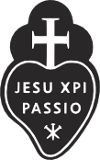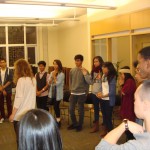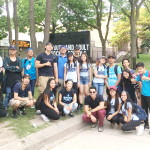Today’s gospel is made up of some sayings of Jesus that were remembered by the early church. The Apostles request, ’increase our faith’ has no connection with Jesus’ sayings about the master and slave.
Maybe one the reasons this request of the apostles, ‘increase our faith’ was remembered was because of the persecutions the early followers of Jesus were suffering. As Jesus warned those who would follow him,’ you will be put out of the synagogue, handed over to the authorities by family members and friends. They would be seen as traitors to the faith of your ancestors.’
Increase our faith. Faith is far more than an intellectual understanding of the truths of our Catholic/Christian faith. Faith is God’s gift to us; we don’t earn or deserve it. Paul tells us that before the world began God chose us in Christ to be his adopted sons and daughters. We are chosen.
Another way of looking at faith is that we trust the truth of Jesus’s words and promises. When Jesus told the people, ‘my flesh is real bread and my blood is real drink’ many of his friends walked with him no more. Jesus challenged Peter,’ will you also go away?’ Basically Peter’s response was,’ I don’t know what you’re talking about but I trust that you have the words of everlasting life, I’m staying.’
And so we ask increase our faith in your real presence as we hear those familiar words ‘take and eat, this is my body, take and drink this is my blood. Bread is more than bread, wine is more than wine; they are the body and blood of the Christ who died for us.
How many times and in how many circumstances in our lives, when nothing makes sense and we see life as so unfair do we ask in some way or another ‘increase our faith’, give us the strength to trust? When we’re faced with the serious illness of ourselves or a family member or friend and we need the strength to say, ’thy will be done.’
Increase our faith, give us the strength to trust, as we struggle with the unfairness of the death of a family member or friend and we ask the question that has no answer, why?
Increase our faith; give us the strength to trust as we struggle to keep our heads above water as we cope with debts or increased rents or unfair wages or the loss of a job.
Increase our faith; give us the strength to trust our vocation as parents as we try to support sons and daughters through their struggles with maturity even though they are convinced we don’t know what we’re talking about.
Increase our faith, give us the strength to trust, as we struggle to forgive a family member of a friend who has wronged us or betrayed our trust. Remember Jesus telling Peter he should be willing to forgive not seven times but seven times seventy
Increase our faith give us the strength to trust as we struggle with our addictions to drugs or alcohol or pornography, when we find ourselves taking one step forward then two steps back
Increase our faith, give us the strength to trust, as we struggle to hold on to our faith as Catholics, embarrassed with the sexual abuse scandals that plague our church and the failure of our bishops as they tried to sweep these crimes under the carpet
We pray that our crucified Lord will restore and increase the faith of so many people, especially young adults who have so easily dismissed the faith in which they were raised. A faith not always positively or evenly clearly taught them.
We all need the honesty of that man in the gospel whose honest reply to Jesus’ question, ‘do you believe I can do this’? Lord, I believe, help the little faith I have.
 Founded by St. Paul of the Cross, every Passionist takes a special vow to spend his or her energies in promoting remembrance of the sufferings of Jesus, the memory of the Cross, and reflection of the meaning of the Cross for the world.
Founded by St. Paul of the Cross, every Passionist takes a special vow to spend his or her energies in promoting remembrance of the sufferings of Jesus, the memory of the Cross, and reflection of the meaning of the Cross for the world.




